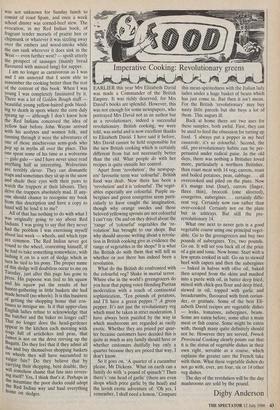a Imperative Cooking: Revolutionary greens EARLIER this year Mrs Elizabeth
David was made a Commander of the British Empire. It was richly deserved, for Mrs David's books are splendid. However, this was not enough for some newspapers, who portrayed Mrs David not as an author but as a revolutionary, indeed a successful revolutionary. British cooking, we were told, was awful and is now excellent thanks to Elizabeth David. I have said it before, Mrs David cannot be held responsible for the new British cooking which is certainly different from but not necessarily better than the old. What people do with her recipes is quite outside her control.
Apart from 'revolution', the newspap- ers' favourite term was 'colourful'. British food was drab. Now there has been a `revolution' and it is 'colourful'. The veget- ables especially are colourful. Purple au- bergines and green courgettes seem parti- cularly to have caught the imagination, though why orange swedes and those beloved yellowing sprouts are not colourful I can't say. On and on they drivel about the `range' of 'colourful' vegetables the 're- volution' has brought to our shops. But why should anyone writing about a revolu- tion in British cooking give as evidence the range of vegetables in the shops? It is what the British do with them that will tell us whether or not there has indeed been a revolution.
What do the British do confronted with the colourful veg? Shake in mortal terror. Where else in the world's greengrocers do you hear that piping voice blending Puritan moderation with a touch of continental sophistication, 'Ten pounds of potatoes, and I'll have a green pepper.'? A green pepper. It's not just the revolutionary veg which must be taken in strict moderation. I have always been puzzled by the way in which mushrooms are regarded as racily exotic. Whether they are priced per quar- ter because customers have decided this is quite as much as any family should have or whether customers dutifully buy only a quarter because they are priced that way, I don't know.
So it goes on. 'A quarter of a cucumber please, Mr Dickens.' What on earth can a family do with 'a pound of spinach'? Then there's 'one head of garlic' (there are even shops which price garlic by the head) and the lavish exotic adventure of: 'Oh yes, I remember, I shall need a lemon.' Compare this mean-spiritedness with the Italian lady laden under a huge basket of beans which has just come in. But then it isn't mean. For the British 'revolutionary' may buy nasty little parcels but she buys a lot of them. This augurs ill.
Back at home there are two uses for these samples, both awful. First, they can be used to feed the obsession for tarting up food. 'I always put a pepper in my beef casserole: it's so colourful.' Second, the old, pre-revolutionary habits can be per- petuated under radical guise. In the old days, there was nothing a Britisher loved more, particularly a northern Britisher, than roast meat with 14 veg; carrots, roast and boiled potatoes, peas, cabbage. . . all overcooked and piled on the plate. Now it's mange tout (four), carrots (finger, three thin), broccoli (one slivered), courgettes, aubergines. . . certainly diffe- rent veg. Certainly now raw rather than over-cooked. Certainly not on the plate but in ashtrays. But still the pre- revolutionary 14.
What one next to never gets is a good vegetable course using one principal veget- able. Go to the greengrocers and buy two pounds of aubergines. Yes, two pounds. Go on. It will set you back all of the price of a gin and tonic. Now home. Start with a few sprats cooked in salt. Go on to stewed beef with capers and then the aubergines — baked in halves with olive oil, baked then scraped from the skins and mashed into a purée with oil, in batter deep fried, mixed with chick-pea flour and deep fried, stewed in oil, topped with garlic and breadcrumbs, flavoured with fresh corian- der, or gratinee. Some of the best Eli- zabeth David recipes are vegetable dishes — leeks, tomatoes, aubergines, beans. Some are eaten before, some after a main meat or fish course. Some might be eaten with, though many quite definitely should not be. However they are served, French Provincial Cooking clearly points out that it is the status of vegetable dishes in their own right, servable as a course, which explains the greater care the French take with them, What these vegetable dishes do not go with, ever, are four, six or 14 other veg dishes, The day of the revolution will be the day mushrooms are sold by the pound.
Digby Anderson


















































 Previous page
Previous page